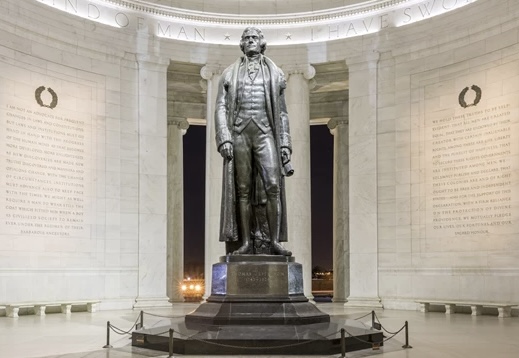20 Thomas Jefferson Quotes for His 275th Birthday
 “The pillars of our prosperity are the most thriving when left most free to individual enterprise.”
“The pillars of our prosperity are the most thriving when left most free to individual enterprise.”
April 13 is Thomas Jefferson’s 275th Birthday. Since I share his birthday, I have long been a fan. But that is mainly because the drafter of the Declaration of Independence was the most prolific of our founders, especially on the topics of liberty and the rights that America was created to preserve and protect. It is worth celebrating his bicenterquasiquigenary (according to the only website I found providing a latin name) by remembering his profound words.
Government Exists Only to Defend Rights
“A free people [claim] their rights as derived from the laws of nature, and not as the gift of their chief magistrate.”
“The true foundation of republican government is the equal right of every citizen in his person and property and in their management.”
“It is to secure these rights that we resort to government at all.”
Liberty Is to Be Limited Only by Equal Liberty
“Rightful liberty is unobstructed action according to our own will within limits drawn around us by the equal rights of others. I do not add “within the limits of the law,” because law is often but the tyrant’s will, and always so when it violates the right of an individual.”
“No man has a natural right to commit aggression on the equal rights of another, and this is all from which the laws ought to restrain him.”
“What more is necessary to make us a happy and a prosperous people?…a wise and frugal Government, which shall restrain men from injuring one another, shall leave them otherwise free to regulate their own pursuits of industry and improvement, and shall not take from the mouth of labor the bread it has earned. This is the sum of good government.”
Government Cannot Take Away Rights
“Our legislators are not sufficiently apprised of the rightful limits of their power: that their true office is to declare and enforce only our natural rights and duties and to take none of them from us.”
“The legitimate powers of government extend to such acts only as are injurious to others.”
“The minority possess their equal rights, which equal laws must protect, and to violate would be oppression.”
“The right of self-government does not comprehend the government of others.”
“It [is] ridiculous to suppose that a man had less rights in himself than…his neighbors …This would be slavery, and not that liberty…for the preservation of which our government has been charged.”
Economic Freedom Is Not to Be Overridden
“The pillars of our prosperity are the most thriving when left most free to individual enterprise.”
“The policy of the American government is to leave their citizens free, neither restraining nor aiding them in their pursuits.”
“To take from one because it is thought that his own industry and that of his father’s has acquired too much, in order to spare to others, who, or whose fathers have not exercised equal industry and skill, is to violate arbitrarily the first principle of association—the guarantee to every one of a free exercise of his industry and the fruits acquired by it.”
“Our wish is that…[there may be] maintained that state of property, equal or unequal, which results to every man from his own industry or that of this fathers.”
Government Power Is to Be Limited
“The functionaries of every government have propensities to command at will the liberty and property of their constituents.”
“We have more machinery of government than is necessary, too many parasites living on the labor of the industrious…it might be much simplified to the relief of those who maintain it.”
“A wise and frugal Government, which shall restrain men from injuring one another, shall leave them otherwise free to regulate their own pursuits of industry and improvement, and shall not take from the mouth of labor the bread it has earned…is the sum of good government.”
“If we can prevent the government from wasting the labors of the people under the pretense of taking care of them, they must become happy.”
Jefferson once asked a seminal question:
“Sometimes it is said that man cannot be trusted with the government of himself. Can he, then, be trusted with the government of others?”
Our founding documents were designed, partly by his hand, to answer that question. America’s federal government was given power restricted to a few enumerated tasks deemed necessary to maintain our rights and sustain our liberty, to minimize the extent to which some would govern others rather than letting them govern themselves. On his 275th birthday, we should reconsider how far America has departed from our founding principles and the importance of reclaiming the liberty we have allowed to be so severely compromised.
AUTHOR
Gary M. Galles
Gary M. Galles is a Professor of Economics at Pepperdine University and a member of the Foundation for Economic Education faculty network.
In addition to his new book, Pathways to Policy Failures (2020), his books include Lines of Liberty (2016), Faulty Premises, Faulty Policies (2014), and Apostle of Peace (2013).
EDITORS NOTE: This FEE column is republished with permission. ©All rights reserved.


Leave a Reply
Want to join the discussion?Feel free to contribute!